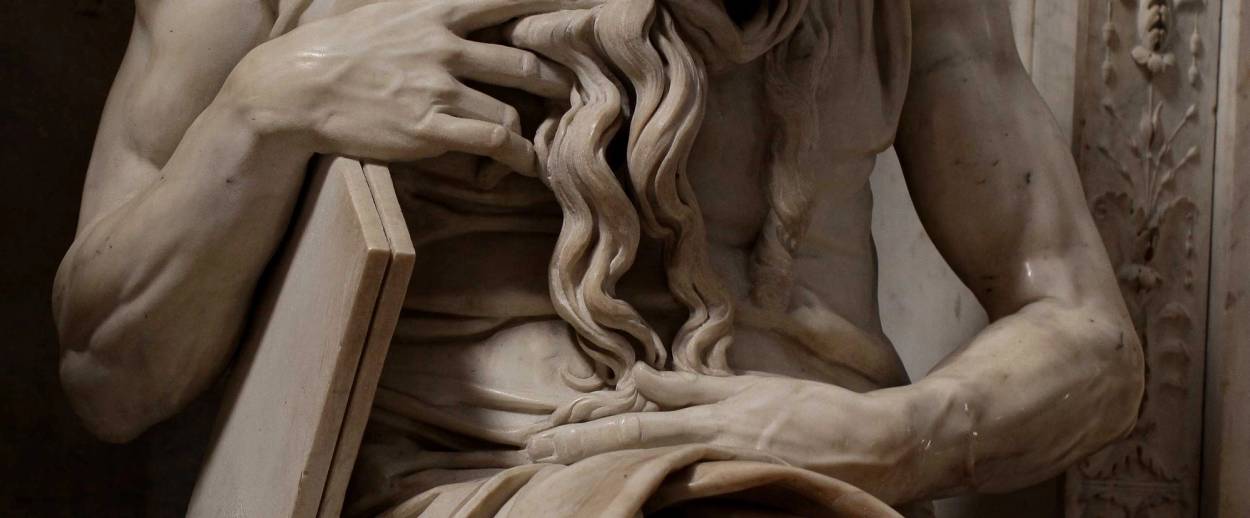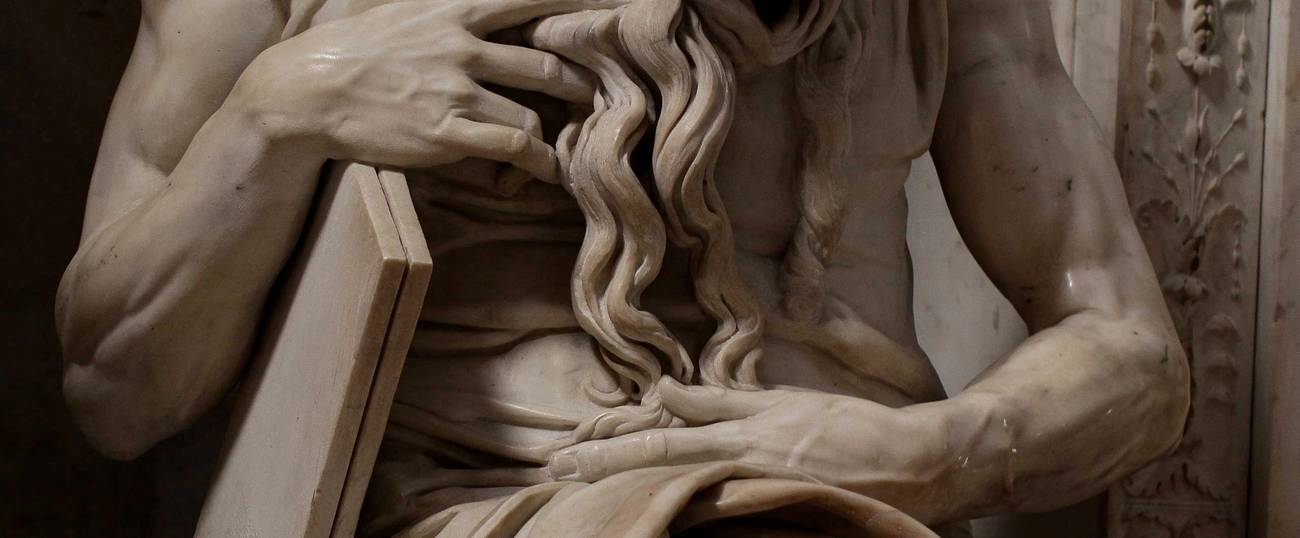Idolizing Moses
An excerpt from Avivah Gottlieb Zornberg’s new biography of the looming figure of Jewish culture




This is a sponsored post on behalf of Yale University Press and its Jewish Lives series.
The question is: What do human beings make of the symbolic object? Those who see it determine whether it does, in fact, symbolize something beyond itself. In the end, the symbol is meaningful only to the extent that it is well read. To divest the symbol of its suggestive power, of its connection with the unknown, is to invest it with a sterile, hectic vitality, which commands banal adoration.
This reading of the “error” of the Golden Calf is sustained through the whole narrative. On the top of the mountain, God informs Moses what has just happened at its base: “Go on down, for your people, whom you have brought out from the land of Egypt, have acted basely” (32:7). God’s words take on a satirical tone. They bring Moses a dreadful revelation: in his people’s eyes, he has become an idol, his charisma symbolizing nothing other than itself. The people have known all too well exactly what they needed. He has failed to represent the infinite, to stir their imagination to thoughts of their “unattained but attainable self.” They have inflated him and at the same time vulgarized him.
In his absence, he has been replaced by the even more vulgar fascination of a golden calf: “They have been quick to turn aside from the way that I commanded them. They have made themselves a molten calf and bowed low to it and sacrificed to it, saying: ‘This is your god, O Israel, who brought you out of the land of Egypt’” (32:8). Using the same formula again, God ironically points up the essential problem. Beyond all the rites of idolatry—the actual making of the Calf, the worship and sacrifices—there is what the people are saying, what they are thinking: the Calf is the new object of adoration, filling the vacuum left by Moses himself.
Rashi offers a vivid Talmudic reading of the state of the people at this juncture:
“Moses was delayed”: When Moses went up the mountain, he told them, By the end of 40 days, I will return—before the sixth hour of the day [midday]. The people thought that the day of his ascent was part of the count, but he meant forty complete days, including the previous night. [When he failed to appear at the expected time] Satan came and threw the world into chaos, and displayed an image of darkness and deep fog and chaos, as if to say, “Surely Moses is dead!— therefore chaos has come to the world! Moses is dead, for the sixth hour has passed and he has not returned!”
Moses is fatally late. The people see his lateness and are thrown into a catastrophic world—satanic, chaotic—the meaning of which is abandonment. How long does it take for them to betray the covenant at Sinai? In Rashi’s narrative, all it takes is perhaps a moment past the expected time. So vulnerable do the people feel that they cannot tolerate an instant without Moses’ palpable presence. If he is absent, he is dead.
The infant, too, knows such moments of total panic. The mother’s absence, under certain circumstances, becomes traumatic. Donald Winnicott describes the infant’s experience as one of “madness”: “Madness here simply means a break-up of whatever may exist at the time of a personal continuity of existence.” The question is whether the infant can remain connected with the mother in her absence. The infant’s distress can be mended if she returns within a subjectively bearable time. Overly long deprivation leaves an indelible wound—the knowledge of “having been mad.”
In this clinical description, Winnicott describes the madness of those who are no longer officially infants. In the Midrashic account, the Israelites react to Moses’ too-long absence with a similar experience of “madness.” Their inner sense of a “sane” world is disrupted. If there is something “infantile” about their condition, this constitutes an error of perception, rather than a sin. For Meshech Chochma, their failing is an optical disorder. What they see is a satanic, chaotic world, with no charismatic figure to walk in front of them. They have not been able to bring to bear upon the image of Moses the larger resources of their own fantasy. Moses’ image fades fast.
In endowing him with too much power, they have surrendered to their desire for fetish objects. The immediacy with which they replace him with the Calf seems to indicate that it serves the same psychic purpose. Unhesitatingly, they substitute for the man Moses a hackneyed object of adoration.
They know all too well what they want. “They have been quick to turn aside,” God tells Moses, ironically. Their instinct to adore the fetish, to endow it with all their own power, is equaled only by the urgency with which they later repudiate it.
***
Excerpted from Moses: A Human Life, by Avivah Gottlieb Zornberg. Copyright © 2016 by Avivah Gottlieb Zornberg. Excerpted by permission of Yale University Press. All rights reserved. No part of this excerpt may be reproduced or reprinted without permission in writing from the publisher.
***
Avivah Gottlieb Zornberg lectures on the Hebrew Bible and rabbinic thought at academic, psychoanalytic, and Jewish educational institutions around the world. In 1995 she received the National Jewish Book Award for Genesis: The Beginning of Desire. She lives in Jerusalem.